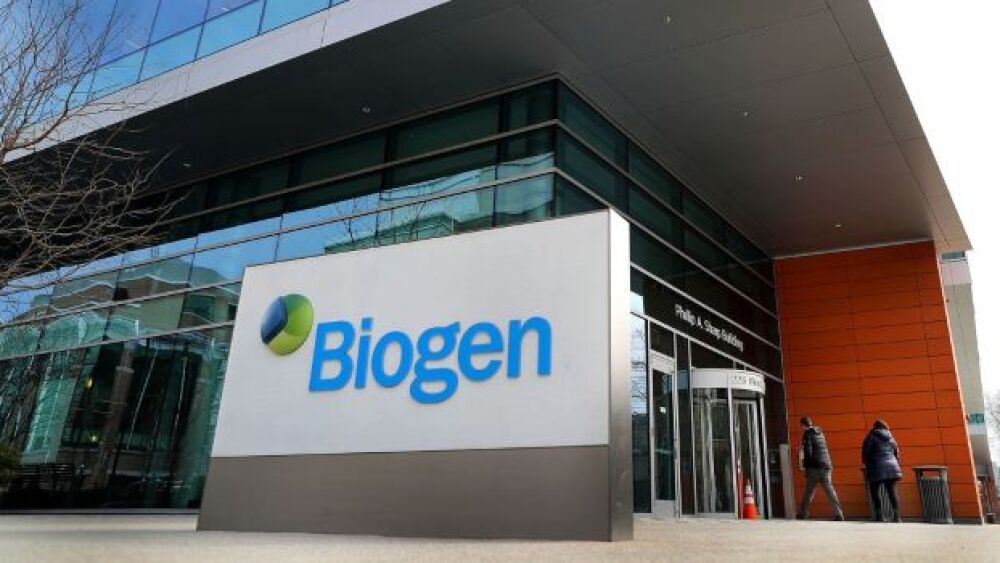Biogen and Ionis Pharmaceuticals announced that their Phase I study of BIIB078 (IONIS-C9Rx) intended for ALS did not meet clinical endpoints, so they will discontinue the program.
John Tlumacki/The Boston Globe via Getty
Biopharma giant Biogen and RNA-targeted therapy leader Ionis Pharmaceuticals announced topline results from their Phase I study of BIIB078 (IONIS-C9Rx), an investigational antisense oligonucleotide for people with a specific type of amyotrophic lateral sclerosis (ALS). The study did not meet clinical endpoints so the clinical program will be discontinued.
Despite the clinical roadblock, the companies “remain committed to their decade-long pursuit of advancing ALS research and developing therapies.”
ALS is a neurodegenerative disorder. The condition affects about 55,000 people worldwide, with 90% of patients having no known family history of the disease. These patients suffer from what is known as sporadic ALS. Ionis has tackled ALS in many of its programs, and BIIB078 is the fourth novel antisense oligonucleotide drug that Ionis has created trying to cure ALS.
This news comes on the relatively recent heels of the Phase III failure of tofersen, an antisense medicine the partners - and ALS community - had high hopes for, in October. While the endpoint in that trial was not met, Biogen touted signs of reduced disease progression across multiple secondary and exploratory endpoints.
As Biogen and Ionis began testing BIIB078, they created a Phase I study involving 106 patients, all of whom had a type of ALS associated with C9orf72. The C9orf72 gene is linked to ALS because mutations in the gene can cause toxic RNA repetition and corresponding dipeptides.
Unfortunately, the randomized, placebo-controlled, dose-escalation trial did not meet its goals. While the drug did meet its primary endpoints of safety and tolerability - it was relatively well tolerated and adverse events were primarily mild to moderate - the study did not show any clinical benefit. In fact, participants who received the drug tended toward a greater decline in motor function than patients who received a placebo across secondary endpoints.
“Unfortunately, this Phase 1 study did not support the hypothesis, suggesting that the disease mechanism is much more complex. While these results do not support further development of BIIB078, we anticipate they will provide valuable learnings that lead to a deeper understanding of this form of ALS,” C. Frank Bennett, Ph.D., executive vice president, chief scientific officer and franchise leader for neurological programs at Ionis, said.
The open-label extension study will also be discontinued. The decision prompted sharp drops in stocks for both companies, with Biogen’s shares trading about 10% lower today and Ionis’ stocks about 1% lower.
Both companies will present the data from this Phase I trial at future scientific forums as part of their ongoing commitment to understanding ALS. With a $3 billion market and sky-high unmet need, ALS is still a disease treatment landscape worth investing in.
Biogen and Ionis may have had disappointing news about ALS, but other companies recently hit some encouraging milestones related to the disease.
Last week, Cambridge, Mass.-based NeuroSense received an investigational new drug (IND) approval from the U.S. Food and Drug Administration for PrimeC, a therapeutic target for ALS. PrimeC is a combination of longtime antibiotic ciprofloxacin and celecoxib, an FDA-approved nonsteroidal anti-inflammatory drug. PrimeC is expected to undergo a Phase IIb double-blind, placebo-controlled study later this year.
Another win for the ALS community comes from Brain Chemistry Labs, a not-for-profit research institute in Jackson Hole, Wyo. Brain Chemistry Labs recently struck a deal with Arlington Scientific, a manufacturer of medical test kits, to make a rapid test kit for BMAA, a cyanobacterial toxin that is linked to ALS. The test was created to investigate cyanobacteria as an environmental cause of ALS, as ALS is rarely associated with a family history of the disease.
In a much-anticipated hearing, Amylyx Pharmaceuticals’ AMX0035 will face a vote by the FDA’s Peripheral and Central Nervous System Drugs Advisory Committee on Wednesday, March 30. Although this committee experienced significant controversy over its last major decision—approving Biogen’s Aduhelm drug for Alzheimer’s disease—the ALS community is keeping its fingers crossed for positive news over a new treatment.





